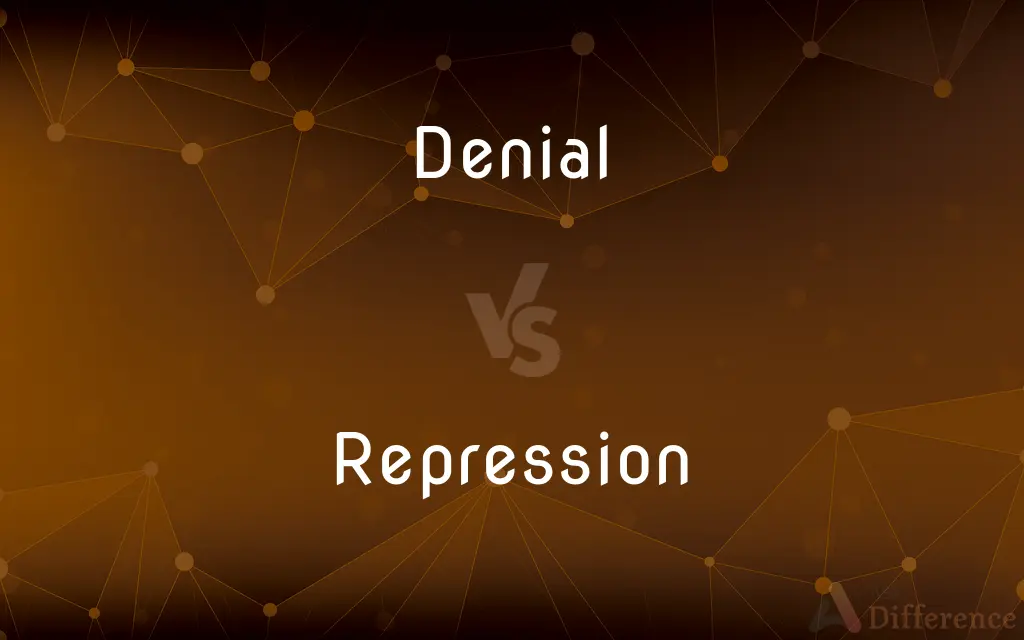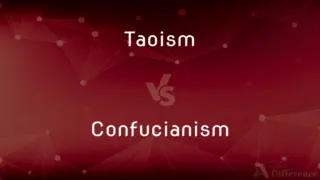Denial vs. Repression — What's the Difference?
Edited by Tayyaba Rehman — By Fiza Rafique — Updated on September 22, 2023
Denial is the outright refusal to accept or acknowledge a certain reality, often as a psychological defense mechanism. Repression, on the other hand, involves subconsciously pushing distressing thoughts or memories out of awareness.

Difference Between Denial and Repression
Table of Contents
ADVERTISEMENT
Key Differences
Denial is an active process of rejecting or disbelieving the reality of a situation or feeling. It functions as a conscious effort to manage emotional discomfort. Repression, in contrast, is less volitional and happens subconsciously to exclude distressing thoughts or memories from consciousness.
In the context of psychological defense mechanisms, denial is often short-lived and pertains to immediate situations or feelings. Repression, conversely, can be long-term and often deals with deeply rooted memories or traumas.
Denial usually involves a categorical rejection of external events or facts. Repression, however, generally involves inner thoughts, memories, or feelings that one finds too distressing to confront consciously.
From a clinical standpoint, denial is generally easier to recognize and treat because it is a conscious action. Repression is often more complex to identify and address because it operates on a subconscious level.
In terms of psychological theories, denial is widely discussed in various schools of thought, including psychoanalytic and cognitive theories. Repression is most commonly associated with Freudian psychoanalytic theory, which posits that repressed thoughts can manifest in various other forms like dreams or slips of the tongue.
ADVERTISEMENT
Comparison Chart
Level of Awareness
Conscious
Subconscious
Timeframe
Usually short-term
Often long-term
Focus
External Events
Inner Thoughts
Ease of Treatment
Easier
More Complex
Theoretical Association
Various
Mostly Freudian
Compare with Definitions
Denial
Rejection of reality.
His denial of the problem made it worse.
Repression
Freudian psychological concept.
Repression is central to psychoanalysis.
Denial
A conscious defense mechanism.
She was in denial about her addiction.
Repression
Can manifest indirectly.
His repression led to unexplained anxiety.
Denial
Disbelief in a situation.
His denial stemmed from shock.
Repression
Subconscious exclusion.
His repression of memories was automatic.
Denial
Refusal to accept facts.
Denial won't change the truth.
Repression
Long-term defense mechanism.
She had years of repressed emotions.
Denial
Emotional coping strategy.
Denial helped her temporarily avoid pain.
Repression
The act of repressing or the state of being repressed.
Denial
Denial, in ordinary English usage, is asserting that a statement or allegation is not true (which might be accurate or inaccurate). It may also mean the refusal of a request, but this article covers denial of true factual claims.
Repression
(Psychology) The unconscious exclusion of painful impulses, desires, or fears from the conscious mind.
Denial
A refusal to comply with or satisfy a request.
Repression
The act of repressing; state of being repressed.
History shows that when governments fear the truth and increase repression, their days are limited.
Denial
A refusal to grant the truth of a statement or allegation; a contradiction.
Repression
The involuntary rejection from consciousness of painful or disagreeable ideas, memories, feelings, or impulses.
Denial
(Law) The formal challenge by a defendant of the truth of an allegation made by the plaintiff.
Repression
The act of repressing, or state of being repressed; as, the repression of evil and evil doers.
Denial
A refusal to accept or believe something, such as a doctrine or belief.
Repression
That which represses; check; restraint.
Denial
(Psychology) An unconscious defense mechanism characterized by refusal to acknowledge painful realities, thoughts, or feelings.
Repression
A state of forcible subjugation;
The long repression of Christian sects
Denial
The act of disowning or disavowing; repudiation.
Repression
(psychiatry) the classical defense mechanism that protects you from impulses or ideas that would cause anxiety by preventing them from becoming conscious
Denial
Abstinence; self-denial.
Repression
The act of repressing; control by holding down;
His goal was the repression of insolence
Denial
An assertion of untruth.
The singer has issued a sweeping denial of all the rumors.
Repression
Hidden from awareness.
The repression was so deep he was unaware.
Denial
(logic) The negation in logic.
The denial of "There might be X" is the null, "False, there is no X."
Denial
A refusal or failure to provide or grant something that is requested or desired.
The denial of medical treatment to those who cannot afford to pay is scandalous.
I cannot understand the bank's denial of my loan application.
Every time we asked for an interview we got a denial.
Denial
Refusal to believe that a problem exists.
We couldn't break through his denial about being alcoholic.
Denial
(psychology) A defense mechanism involving a refusal to accept the truth of a phenomenon or prospect.
He is in denial that he has a drinking problem.
Denial
A disownment or disavowal
The denial of Jesus by Peter.
Denial
The act of gainsaying, refusing, or disowning; negation; - the contrary of affirmation.
You ought to converse with so much sincerity that your bare affirmation or denial may be sufficient.
Denial
A refusal to admit the truth of a statement, charge, imputation, etc.; assertion of the untruth of a thing stated or maintained; a contradiction.
Denial
A refusal to grant; rejection of a request.
The commissioners, . . . to obtain from the king's subjects as much as they would willingly give, . . . had not to complain of many peremptory denials.
Denial
A refusal to acknowledge; disclaimer of connection with; disavowal; - the contrary of confession; as, the denial of a fault charged on one; a denial of God.
Denial
The act of refusing to comply (as with a request);
It resulted in a complete denial of his privileges
Denial
The act of asserting that something alleged is not true
Denial
(psychiatry) a defense mechanism that denies painful thoughts
Denial
Renunciation of your own interests in favor of the interests of others
Denial
A defendant's answer or plea denying the truth of the charges against him;
He gave evidence for the defense
Common Curiosities
Is repression a defense mechanism?
Yes, it functions to keep distressing thoughts out of awareness.
What is denial?
An active rejection or disbelief in a situation or fact.
How do denial and repression differ?
Denial is conscious and usually short-term, while repression is subconscious and often long-term.
Is denial a defense mechanism?
Yes, it serves to protect oneself from emotional discomfort.
Is denial associated with any theories?
Yes, it is discussed in various psychological theories.
Is repression Freudian?
Mostly, it's a central concept in Freudian psychoanalysis.
Can repression focus on external events?
Less commonly, it usually involves inner thoughts or memories.
How is denial recognized?
Through conscious statements or actions contradicting reality.
What is repression?
A subconscious exclusion of distressing memories or thoughts.
Is repression difficult to treat?
Often, because it operates subconsciously.
How is repression recognized?
Often through symptoms like anxiety or during psychotherapy.
Can repression have long-term effects?
Absolutely, it can lead to various psychological issues.
Can denial focus on internal emotions?
Rarely, it usually pertains to external events or facts.
Is denial easier to treat?
Generally, because it operates at a conscious level.
Can denial have long-term effects?
Yes, if not addressed, it can lead to emotional stagnation.
Share Your Discovery

Previous Comparison
Taoism vs. Confucianism
Next Comparison
Liveware vs. FirmwareAuthor Spotlight
Written by
Fiza RafiqueFiza Rafique is a skilled content writer at AskDifference.com, where she meticulously refines and enhances written pieces. Drawing from her vast editorial expertise, Fiza ensures clarity, accuracy, and precision in every article. Passionate about language, she continually seeks to elevate the quality of content for readers worldwide.
Edited by
Tayyaba RehmanTayyaba Rehman is a distinguished writer, currently serving as a primary contributor to askdifference.com. As a researcher in semantics and etymology, Tayyaba's passion for the complexity of languages and their distinctions has found a perfect home on the platform. Tayyaba delves into the intricacies of language, distinguishing between commonly confused words and phrases, thereby providing clarity for readers worldwide.
















































